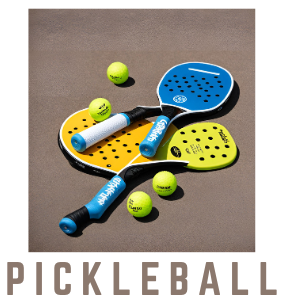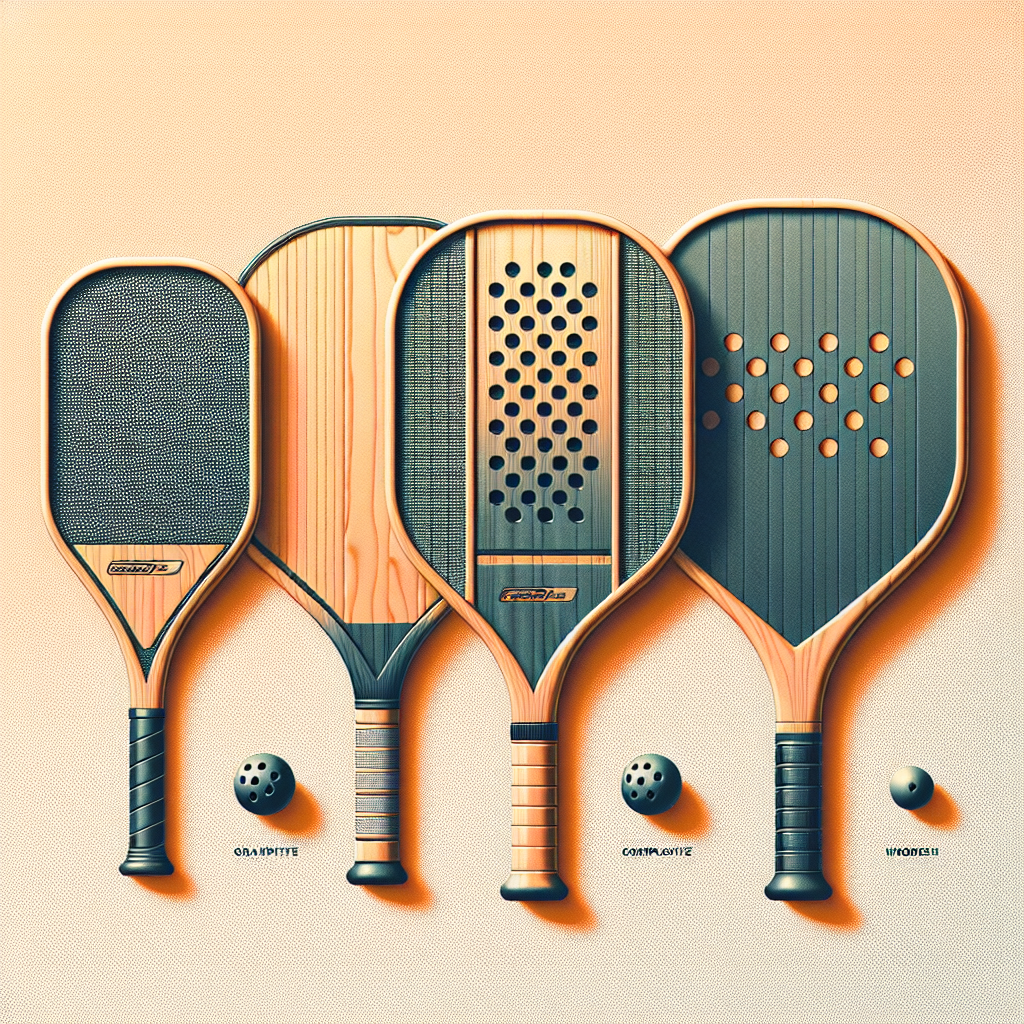So, you’ve discovered the exciting sport of pickleball and now you’re faced with the question: what kind of pickleball paddle should I buy? With so many options available, it can be overwhelming to navigate through the endless choices. But fear not! In this article, we’ll guide you through the process of finding the perfect paddle that suits your playing style and helps you conquer the court. From paddle materials to weight and grip size, we’ve got you covered. Let’s dive into the world of pickleball paddles and find the one that’s right for you!
Introduction
Choosing the right pickleball paddle is essential for enhancing your game and enjoying your playing experience. With so many options available in the market, it can be overwhelming to decide which one is best for you. However, by considering factors such as skill level, weight, grip size, materials, core, face, edge guard, price, brand, and personal preference, you can make an informed decision and find the perfect pickleball paddle that suits your needs and preferences.
Factors to Consider
Skill Level
Your skill level is an important factor to consider when choosing a pickleball paddle. Different paddles have varying characteristics that cater to different skill levels.
Beginner
If you are a beginner, it is recommended to choose a paddle that offers a larger sweet spot, provides control, and is forgiving with off-center hits. These features help beginners gain accuracy and confidence in their shots.
Intermediate
As an intermediate player, you might be seeking a paddle that offers a balance of control and power. Look for a paddle that allows you to maneuver the ball effectively while still delivering some power behind your shots.
Advanced
Advanced players typically prefer a pickleball paddle that maximizes power and control. These players have developed a solid technique and benefit from a paddle that can deliver powerful shots while maintaining precision.
Weight
Pickleball paddles come in different weights, and choosing the right weight for you depends on your playing style and personal preference.
Lightweight
Lightweight paddles are typically preferred by players who value maneuverability and quick reaction times. These paddles are easier to handle and allow for faster swings, making them suitable for players with a finesse or defensive playing style.
Mediumweight
Mediumweight paddles strike a balance between power and control. They offer enough weight to generate power behind your shots while still providing maneuverability and control. This weight range is often suitable for a wide range of players.
Heavyweight
Heavyweight paddles prioritize power and stability. These paddles are well-suited for players who rely on strong, aggressive shots. The additional weight helps generate momentum and force in your swings, giving you an advantage in power plays.
Grip Size
The grip size of a pickleball paddle refers to the circumference of the handle. Choosing the right grip size is crucial for comfort and control during gameplay.
Small
Small grip sizes are suitable for players with smaller hands or those who prefer a tighter grip. These paddles offer better control and allow players to maintain a firm grip throughout the game.
Medium
Medium grip sizes are the most commonly used and cater to a wide range of players. They provide a balance between comfort and control, accommodating players with average-sized hands.
Large
Large grip sizes are suitable for players with larger hands or those who prefer a looser grip. These paddles offer enhanced stability and control for players with bigger palms.
Materials
The materials used in pickleball paddles can greatly affect their performance and durability. Understanding the different materials available will help you make an informed decision.
Wood
Wooden paddles are often the most affordable option and are commonly used by recreational players. While they provide good control and a traditional feel, they may lack power and durability compared to other materials.
Composite
Composite paddles are made from a combination of materials such as fiberglass, carbon fiber, and polymer. These paddles offer a good balance between power, control, and touch. They are known for their durability and are suitable for players of all skill levels.
Graphite
Graphite paddles are known for their lightweight construction and excellent power. These paddles provide a lot of control and maneuverability, making them a popular choice among players who value a quick response. However, graphite paddles may be more prone to damage and require careful usage.
Fiberglass
Fiberglass paddles offer a nice blend of power and control. They are known for their durability and can withstand regular gameplay without significant wear and tear. Fiberglass paddles offer a softer touch compared to graphite paddles.
Carbon Fiber
Carbon fiber paddles are top-of-the-line when it comes to performance. They offer exceptional power, control, and maneuverability, making them a top choice for advanced players. However, they tend to be more expensive and may require a higher level of skill to fully utilize their potential.
Core
The core of a pickleball paddle refers to the interior construction, which greatly impacts its performance.
Polymer Honeycomb
Paddles with a polymer honeycomb core offer a combination of power, control, and touch. The honeycomb design provides a light, yet sturdy structure, allowing for enhanced ball control and improved shot accuracy.
Nomex Honeycomb
Paddles with a Nomex honeycomb core are known for their power and pop. The Nomex material provides a solid, dense core that can generate strong shots. However, these paddles may offer less control and have a stiffer feel compared to other core materials.
Aluminum Honeycomb
Paddles with an aluminum honeycomb core offer a unique combination of power, control, and durability. The aluminum core provides a solid foundation for powerful shots, while still allowing for good touch and control on the ball.
Polypropylene
Paddles with a polypropylene core are known for their quietness and control. Polypropylene cores offer excellent control and a softer touch, making them suitable for players who prioritize finesse and precise shots.
Face
The face of a pickleball paddle refers to the hitting surface. Different face surfaces offer varying levels of spin, control, and feel.
Textured Surface
Paddles with a textured surface offer enhanced spin potential. The rough surface allows for better grip on the ball, resulting in increased control and spin on your shots. These paddles are favored by players who enjoy adding spin to their shots.
Smooth Surface
Paddles with a smooth surface provide a traditional feel and offer good control. The smooth surface allows for consistent shot placement, making these paddles suitable for players who prioritize accuracy.
Hybrid Surface
Paddles with a hybrid surface combine both textured and smooth elements, offering a compromise between spin and control. These paddles provide a balance between grip and shot placement, catering to players with a versatile playing style.
Edge Guard
The edge guard of a pickleball paddle refers to the protective strip around the edge. It helps protect the paddle from accidental damages and can affect the overall weight and feel.
Edgeless
Paddles without an edge guard offer a larger hitting surface and a sleek look. These paddles are lightweight and offer an extended sweet spot, allowing for maximum coverage on the ball.
Half-inch
Paddles with a half-inch edge guard provide a moderate level of protection while minimizing any additional weight. These paddles strike a balance between durability and a larger hitting surface.
Full-inch
Paddles with a full-inch edge guard provide maximum protection against accidental damages. These paddles are ideal for players who often play near the court boundaries or are prone to paddle clashes.
Price
The price of a pickleball paddle can vary greatly depending on its quality, materials, and brand. It is important to set a budget and consider the overall value, performance, and durability of the paddle you choose.
Brand
The brand of a pickleball paddle can play a role in its quality and reputation. Established brands often have a proven track record in producing high-quality paddles. It is worth considering the reputation of the brand and reading reviews from other players before making a purchase.
Personal Preference
Ultimately, personal preference plays a significant role in choosing the right pickleball paddle. Factors such as aesthetics, feel, and even color can affect your overall enjoyment and confidence in the game.
Testing Paddles
If possible, try testing different paddles to get a feel for their weight, grip, and performance. Many local pickleball clubs or sporting goods stores offer paddle rental or demo programs, allowing you to try different paddles before making your final decision.
Try Before You Buy
If testing paddles is not an option, consider borrowing a paddle from a friend or fellow player to try it out during a friendly game. This can give you a better understanding of your preferences and help you narrow down your choices.
Reviews and Recommendations
Reading reviews and seeking recommendations from experienced pickleball players can also provide valuable insights into different paddle options. Consider joining online pickleball forums or engaging with the pickleball community to gather information and opinions.
In conclusion, choosing the right pickleball paddle involves considering factors such as skill level, weight, grip size, materials, core, face, edge guard, price, brand, and personal preference. By understanding your playing style and preferences, testing different paddles, and gathering feedback from other players, you can make an informed decision and select a paddle that enhances your game and brings you joy on the pickleball court.

